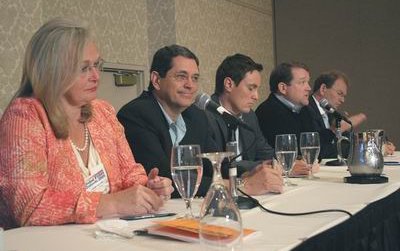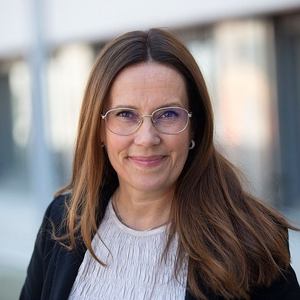The GAFO: 2005 program included panel discussions as well as individual presentations. The "Constraints and Opportunities" panel, comprised of Linda Chaves, Bill Herzig, Helgi Eiriksson, John Connelly and Wout Dekker, stressed the importance of communicating the health benefits of seafood to consumers.
Global Aquaculture Alliance took another successful step into the fish arena with its May 23-25 Global Aquaculture Fish Outlook meeting in Chicago. The conference was attended by 108 delegates who represented a wide variety of species groups and market sectors from the Americas, Europe and Asia.
Presenters described a global fish market with declining prices that pressure producers. Such pressure is further accentuated by conflicts between the wild and aquaculture sectors, rising fuel and transportation expenses, trade disputes and the continually evolving regulatory and NGO landscape.
Despite the range of issues and perspectives at GAFO, presenters and participants consistently viewed the road ahead in the same way. They stressed the importance of cooperation to resolve common issues and communicate the health benefits of seafood.
"We came together with separate voices, but left speaking with one," said Bill Herzig of Darden Restaurants. In his closing comments, Herzig recommended that producers, suppliers and trade associations work together to communicate with consumers, regulators, opinion leaders, researchers and NGOs.
The GAFO presentations began with production overviews of key species groups. From channel catfish and rainbow trout to tilapia, Atlantic salmon and other species, experts described production methods, current and projected production levels, and constraints and opportunities.
For example, Bert Bachmann of Salmon of the Americas said today's annual farmed salmon production will likely nearly double to 2.5 million tons by 2010. However, prices have fallen 68% from 1987 levels to U.S. $4.95 per pound in 2005. Of the major salmon-producing regions, Chile was estimated to have the lowest production costs.
Europe, the top global salmon consumer, is expected to maintain its lead over the United States and Japan through 2010. However, consumption is rising rapidly in the U.S. market, where declining prices led to a 264% increase in consumption since 1995.
Several speakers addressed issues that challenge fish aquaculture. Participants concurred that dependency on fishmeal in feeds must be addressed by assuring the continued sustainability of industrial fisheries and reduction of fishmeal levels in diets. Seafood safety and quality were reviewed in terms of environmental and chemical contaminants, the use of unapproved drugs and treatments, economic adulteration and traceability.
In his discussion of trade issues, Warren Connelly of Akin Gump Strauss Hauer & Feld LLP cited recent examples of U.S. trade disputes involving imported crawfish, salmon, crabmeat, catfish and shrimp. He warned that trade disputes will continue as protectionist pressures mount and provided advice about pending trade concerns and means of preparing for trade-related crises.
Mike Karppe of Darden Restaurants, Ken Kimble of Costco and Gary Johnson of McDonald's Corp. discussed the casual dining, warehouse club and quick service restaurant sectors of the U.S. fish market. Ragnar Tveteras analyzed the shifting structure of the traditional seafood business in Europe. Helgi Anton Eiriksson of Islandsbanki provided a lender's overview of the future challenges and opportunities of aquaculture.
The keynote address was presented by Wout Dekker, CEO of Nutreco Holding N.V. He described both the aquaculture dream of continued sustainable growth and the aquaculture nightmare of mistakes and mismanagement. Which future awaits, he said, depends on how the aquaculture industry deals with issues and gains consumer trust through dialogue, partnerships and independent endorsements.
Some early-arriving GAFO delegates played golf at a nearby resort, while others chose to sightsee in the Chicago area. The meeting then began with a welcome reception at the Hyatt Lodge on McDonald's Corp.'s corporate campus. The barbecue event featured grilled tilapia, salmon, cobia and shrimp contributed by platinum sponsor Grobest and gold sponsor Camanchaca Inc.
The event was also supported by Harbor Seafood, Eastern Fish Co., Enaca and Zeigler Brothers, Inc.
The GAFO Program Committee is now exploring options for the GAFO: 2006 venue. For additional information on this or next year’s conference, contact the Global Aquaculture Alliance office: gaa1@attglobal.net.
GAA is an international, nonprofit trade association dedicated to advancing environmentally and socially responsible aquaculture.











